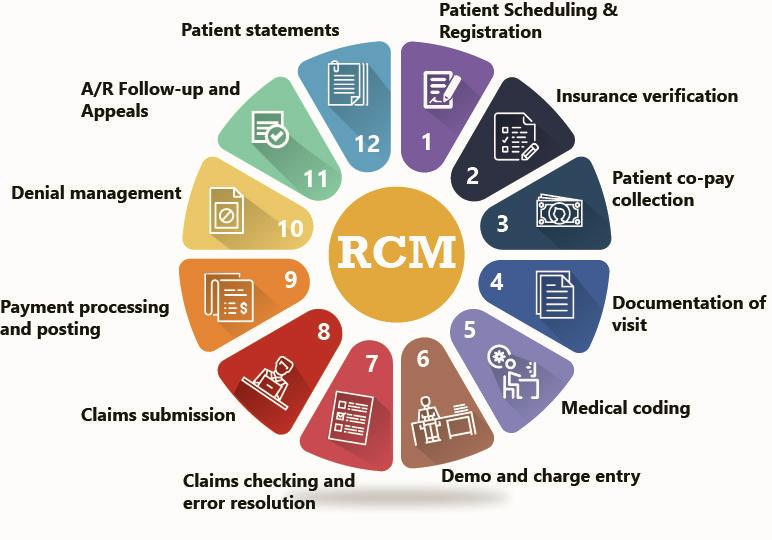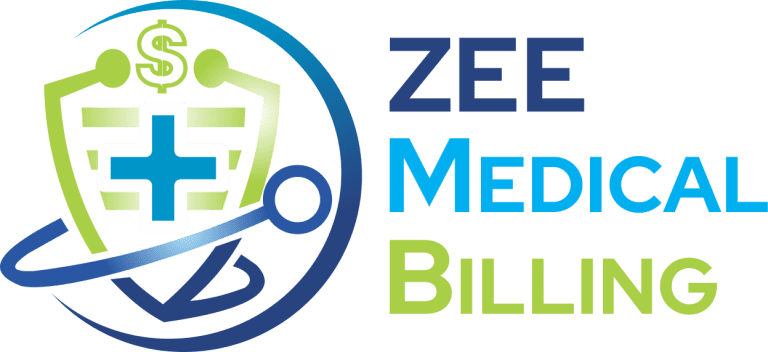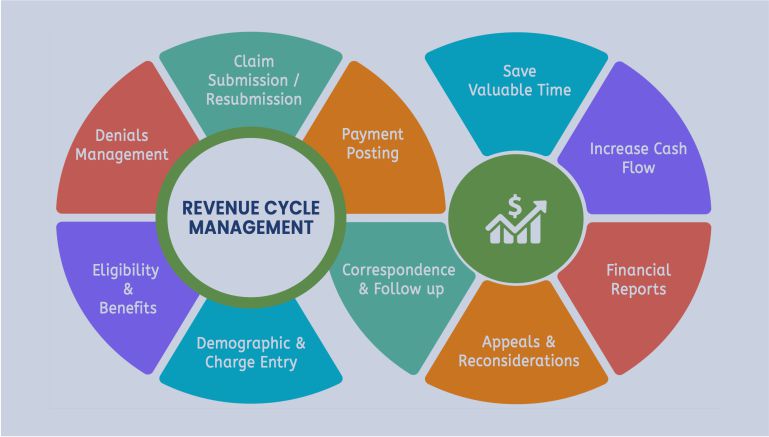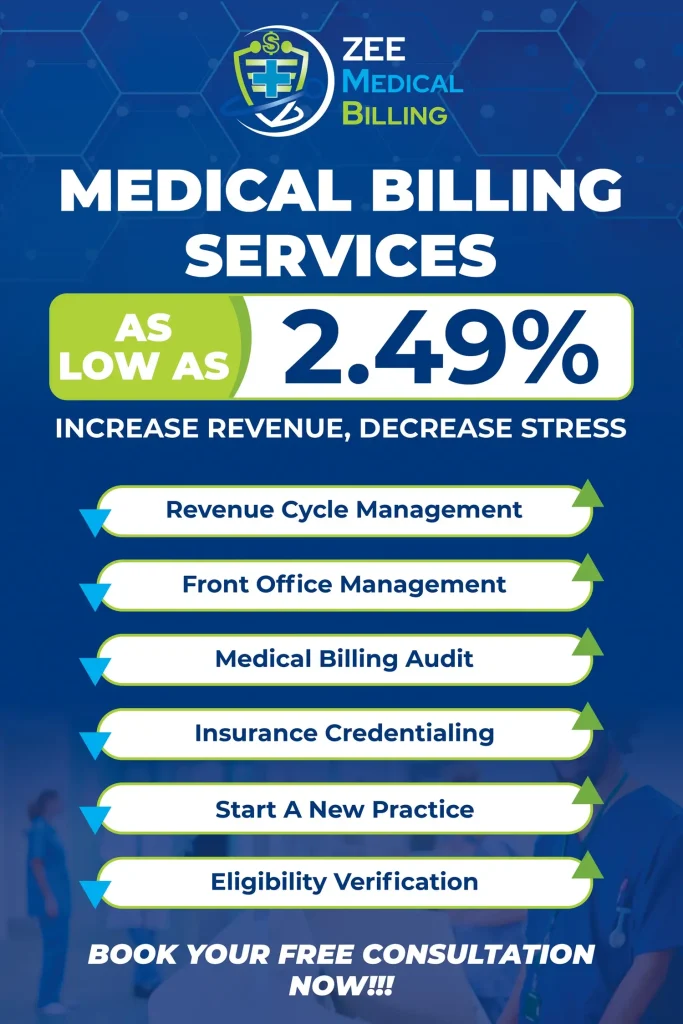What advantages can be derived from applying Medical Revenue Cycle Management in your organization? Of these questions, we find this one raised most often by our audience. In modern-day insurance services, managing your revenue cycle has become very rewarding yet requires much patience.
Rules change constantly, the insurances are tough, and patients have great demands. In this form of a situation there arises wastage of revenue and problems in cash collections and management of operations. Every day, people working in the healthcare industry are increasingly moving towards adopting RCM solutions.
This blog will highlight to the reader seven key advantages that can be derived if medical revenue cycle management services are carried out in the healthcare industry. Read the complete blog to learn tips, tricks, and methods to help you improve your RCM knowledge. Also, check out ‘How to Choose the Best Medical Billing Services in the USA’ for more insights.
What are Medical Revenue Cycle Management Services?
Medical Revenue Cycle Management (RCM) services relate to the complete management of finances related to the health care service. They assist in every step, from patient registration to the final payment stage. The services encompass various administrative and clinical functions designed to enhance revenue, guarantee precise billing, and uphold compliance with regulations. This finance management strategy for medical organizations is becoming popular in healthcare. Studies show that the RCM market is expected to surpass $238 billion by 2030. Implementing RCM services offers various benefits, improving financial performance and patient satisfaction.

Types of RCM Services:
When healthcare facilities require additional assistance Support, and Administrative Services comprise various services Medical Revenue Cycle Management RCM includes several services aimed at improving the financial processes within the healthcare organizations.
The primary types of RCM services are outlined as follows:
- Patient Registration Services: Accurate patient registration ensures that all essential information is collected at the outset. An essential component of continuous billing and eligibility verification from the patient’s first appointment.
- Insurance Verification and Eligibility Services: This particular service reviews a patient’s insurance coverage and its benefits in advance to reduce or eliminate the chances of claims being denied. It informs healthcare providers of any coverage terms or requirements.
- Claims Submission Services: This service assists healthcare providers by discreetly billing the insurance dues. Submitting all relevant papers in this process is essential to avoid payment delays.
- Payment Posting Services: The insurance and self-funded patients’ collective amount must be disbursed and the recording of it must be done right. This is because it is a record that helps the firm keep track of the creditors and manage the cash flow properly.
- Financial Reporting and Analytics Services: The highlight of this service is the regular reports of financial performance, including key metrics that show the company’s revenue and cash flows. Analytics is used as the tool that uncovers the emergence of potential risks and phenomena; hence, data-based decisions for revenue and improved financial health are presented.
Implementing Medical Revenue Cycle Management Services: 7 Key Benefits

Are you considering setting up RCM in your healthcare organization but feeling uncertain? We will clarify the significance of this matter. Here are compelling reasons to implement medical revenue cycle management services:
1. Improved Cash Flow
Implementing RCM services offers a significant advantage in enhancing cash flow. This enhances your billing and collections procedures. Additionally, they allow healthcare organizations to reduce the time required to obtain payments significantly. Establishing an effective revenue cycle guarantees the timely submission of claims.
Also, they make sure your outstanding invoices are handled promptly. The payments are processed accurately, resulting in improved cash flow. We highly recommend that you consider utilizing RCM services. The organization implementing these finance management strategies has observed a reduction in days in accounts receivable, which positively impacts their financial stability.
2. Enhanced Billing Accuracy
Billing accuracy in healthcare is crucial, as even minor errors can lead to claim denials or delays. RCM services utilize advanced technologies and experienced professionals to ensure precise billing and coding. It minimizes errors and improves reimbursement opportunities. When discrepancies in billing are minimized, healthcare organizations can foster trust with patients and insurance providers. Implementing this finance management strategy in healthcare can lead to a more efficient revenue cycle.
3. Increased Operational Efficiency
RCM services enhance various management activities, enabling healthcare workers to direct their attention to providing care to patients rather than engaging in laborious billing tasks. It makes tasks like scheduling appointments and filing claims easier.
Incorporation of Medical Revenue Cycle Management Services substantially improves operational performance while minimizing strain on personnel. This benefits the staff as their energies will be put into more productive endeavors; hence, strategic allocation of resources becomes more efficient, leading to better gainful output.
4. Better Compliance with Regulations
Some rules and regulations govern the healthcare systems, and failure to comply may result in dire consequences. RCM services aid firms in adequately adjusting to law changes to comply with the ever-changing billing rules.
They additionally assist in helping you stay updated with coding practices and insurance requirements. By applying advanced skills and modern tools, RCM services are geared towards minimizing the risks associated with non-adherence to regulations to shield healthcare institutions from imminent legal and economic threats.
5. Improved Patient Experience
A smooth billing procedure helps ensure that patients have a great experience. RCM services help improve communication regarding financial responsibilities. Make sure patients get billing statements that are easy to understand and correct.
Healthcare companies can enhance patient satisfaction and build loyalty. It also helps to lessen the confusion and annoyance of invoicing. When patients are happy with the services they get, they tend to share their positive experiences with others. This can help the organization grow and improve its brand reputation.
6. Valuable Data Insights
When Management Services for Medical Revenue Cycle is implemented, healthcare units can generate perspectives and analytics on their finances by evaluating specific parameters such as claim denial rates and payment turnaround times. Organizations can analyze changes over time and look for improvements. Based on factual evidence, healthcare leaders are in a position to make strategic choices. They can also implement strategies that help to improve the financial results and streamline processes.
7. Scalable Growth Solutions
As healthcare organizations expand, their revenue cycle management requirements become increasingly intricate. RCM services provide flexible solutions that can grow with rising patient numbers and broader service offerings.
When a practice expands by adding new specialties or growing its patient base, RCM services can offer the essential support needed to handle that growth smoothly. This scalability helps organizations to keep thriving in a competitive healthcare environment.
FAQs
Q1. What is revenue lifecycle management?
Ans: A thorough comprehension of the entire customer experience, including the stages and steps and their growth potential – and improving the outcomes at each stage. RLM incorporates several elements, including marketing, selling, financial management, analytical processes, operational procedures, and customer interaction management.
Q2.What is the first step of the process in the revenue management cycle?
Ans: This process, often referred to as prior authorization, requires getting approval from a patient’s insurance company before delivering specific medical services. This approval means that the healthcare provider will get paid for their services.
Q3. What is AR in medical billing?
Ans: Accounts receivable (AR) refers to the aggregate amount of money that patients, health insurance companies, or any other external entities owe to a particular service provider within the healthcare setting in medical billing.
Q4. What does RCM mean in the context of an audit?
Ans: Revenue cycle management (RCM) in the healthcare field includes financial limitations evaluation, that is, the scrutiny of the health services facilities’ financial records, functions and activities performed, and the skillful processes within a given period. This audit process aims to ensure compliance, assess health systems’ financial risks, and enhance the health system’s financial performance.
Q5. What are the six stages of the revenue cycle?
Ans: This RCM process consists of Patient pre-arrival, Patient arrival (Registration), Charging of services provided/ Charge Entry, Submission of claims, Remittance processing, and collections cycles. Familiarizing with these stages enables the health systems to focus on collecting the revenue earned and ensuring that the quality of services provided and compliance are not compromised.
Conclusion
Implementing medical revenue cycle management services can yield significant benefits for healthcare organizations, including improved cash flow, enhanced billing accuracy, increased operational efficiency, better compliance, improved patient experience, data-driven insights, and scalability for growth. As the healthcare landscape evolves, leveraging RCM services becomes essential for maintaining financial health and delivering exceptional patient care.
Is your healthcare organization facing challenges in optimizing billing and collections processes? Therefore, there is no need to worry any longer. Zee Medical Billing is here to assist you with that. We have a specialist team focused on improving healthcare providers’ cash flow and financial health. In the above, we discussed 7 Key Benefits of Integrating Medical Revenue Cycle Management Services in the Healthcare System.
Are you looking to enhance your revenue cycle? Contact us today! Also, learn how to optimize Your Healthcare Finances With Our RCM Services.









